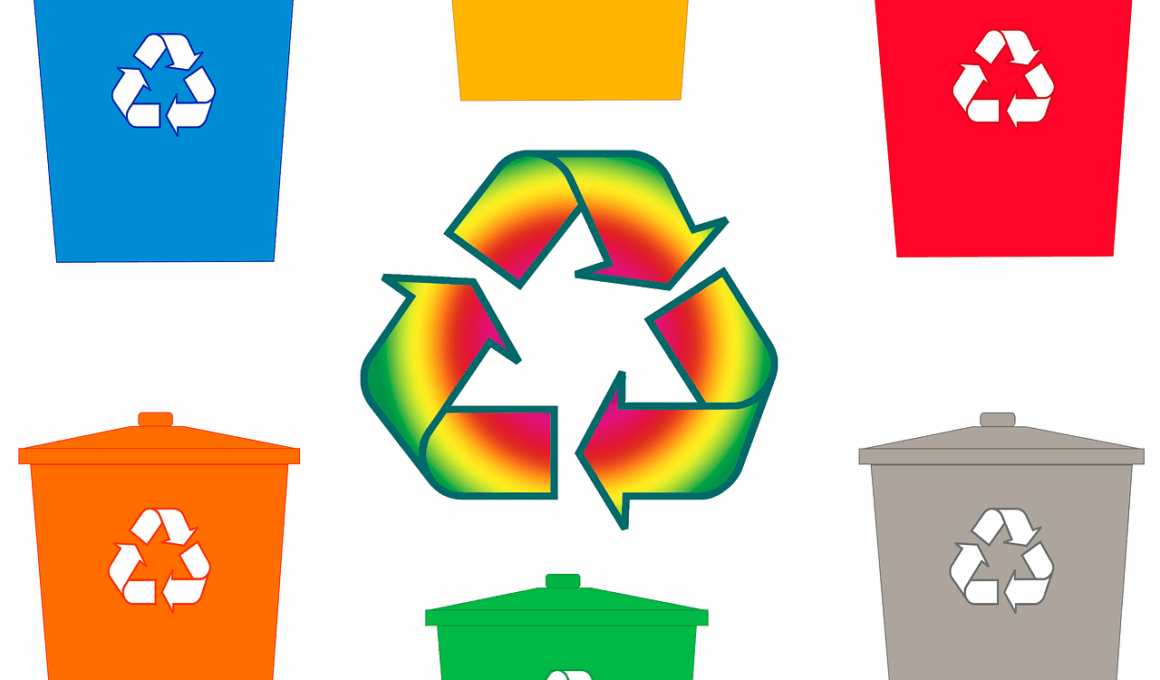Top 10 Effective Recycling Programs Around the World
Recycling programs play a critical role in waste management and environmental sustainability. One of the most successful models is the **Swedish Recycling System**, which boasts an amazing recycling rate of about 99%. In Sweden, 84% of waste is reused or recycled, and only 1% is sent to landfills. This achievement is attributed to their well-structured systems such as mandatory recycling laws, education initiatives, and community engagement. Citizens are encouraged to separate their waste, which the government processes efficiently. Additionally, **technology** aids in optimizing these processes, allowing for greater reductions in resource wastage. Another exemplary program is found in **Germany**, where the *Green Dot program* promotes packaging recycling. This initiative uses a system where companies pay to use green dot labels indicating the packaging is recyclable. Such incentives not only increase recycling rates but also empower consumers to opt for sustainable products. By creating such environmentally friendly policies, countries like Sweden and Germany set strong examples for others to follow. Recycling improves resource conservation, reduces pollution, and fosters a healthier planet for future generations, emphasizing the importance of effective recycling programs globally.
In **Taiwan**, a robust waste management system has made it a leader in recycling. Their **three-bin system** allows for easy disposal of recyclables, organic waste, and general trash. This clear classification encourages citizens to recycle effectively, contributing to Taiwan’s impressive recycling rate, which exceeds 55%. Initiatives like *cash rewards for recyclables* further motivate participation. Encouraging community involvement can significantly improve the effectiveness of recycling programs. *South Korea* has also adopted innovative methods, such as *volume-based waste fees*, charging households based on their waste output. This scheme promotes reducing waste by motivating families to sort recyclables. Additionally, campaigns educate the public on recycling’s benefits, bolstering community commitment to sustainable practices. The focus on reducing waste at the source, alongside robust recycling framework, has enabled South Korea to increase recycling rates markedly. Understanding how different cultural contexts shape recycling practices can provide insights into program effectiveness. These effective systems highlight the potential positive impact when appropriate measures are embraced within communities. Comprehensive strategies lead not only to higher recycling rates but also to lasting changes in attitudes toward waste, fostering environmental accountability among citizens.
The **Zero Waste movement** in *San Francisco* exemplifies how cities can strive for sustainability. The goal is to divert 100% of waste from landfills, and they have consistently shown impressive results with diversion rates surpassing 80%. Their approach consists of an extensive composting program and innovative recycling services that support this mission. Locations for depositing recyclables are conveniently situated, making participation accessible for everyone. Community education programs emphasize responsible waste habits, demonstrating how proactive citizenship matters in aiding these efforts. In the United States, cities like *Seattle* also exemplify robust recycling frameworks, where *mandatory recycling laws* increase participation rates. Citizens are expected to either recycle their waste properly or face fines, increasing accountability. These regulations contribute to strong municipal recycling rates, showcasing the vital role legislation plays in recycling initiatives. The significant impact of these programs highlights how local governments can lead and innovate in environmental stewardship. As cities contend with rising pollution levels and a global waste crisis, establishing thorough and visionary recycling initiatives has become critical. Engagement starts locally, but the ripple effects can focus on long-term environmental improvements globally.
The **Netherlands** is renowned for its well-organized waste management system, which promotes extensive community involvement in recycling efforts. With an overwhelming ***70%+*** recycling rate, the country emphasizes the importance of public participation. **Community funds** finance local recycling initiatives, promoting a sense of ownership in sustainable practices. Programs like the *Circular Economy Initiative* aim to minimize waste by reusing materials and focusing on sustainable production methods. In addition to influencing positive consumer behavior, these initiatives encourage businesses to adapt their practices sustainably. Another commendable recycling program comes from **Japan**, where strict waste segregation rules dictate how citizens dispose of their trash. Residents must diligently adhere to local recycling practices to avoid penalties, fostering a culture of responsibility. Through this emphasis on community engagement and education, Japan enjoys a high level of compliance and impressive recycling rates. In Japan, educational campaigns guide citizens through proper e-waste disposal due to the increasing prevalence of discarded electronics. The successes of these nations highlight the importance of a multi-faceted approach that combines policy, community effort, and education in achieving effective recycling outcomes. Collaborative endeavors are thus essential in tackling global waste challenges.
Implementing the *Returnable Bottle System* in **Norway** has proven beneficial for both the environment and local economies. Norway recycles an impressive ***97%*** of its plastic bottles, relying on incentivizing the return of bottles through a deposit system. Customers pay an additional fee upon purchase that can be reclaimed by returning those bottles to designated spots. This effective solution addresses plastic pollution while stimulating local businesses. The simplicity of the return process encourages high participation rates, contributing significantly to Norway’s waste management success. Similarly, **Finland** operates a comprehensive recycling initiative by integrating education into schools. Programs emphasize the significance of recycling from an early age, encouraging students to engage actively in sustainable practices and awareness. Finland has seen remarkable successes, with around 40% of all recycled waste originating from schools. The interplay of education and community engagement is paramount for sustainability. By focusing on proper practices from an early stage, Finland helps establish responsible citizens prepared to tackle future waste management challenges. These diverse approaches underscore creativity in recycling methods that can address locality needs. Collectively, these countries serve as examples demonstrating how integrating economic, social, and education can amplify recycling efficacy.
In **Barbados**, sustainable practices are woven into everyday operations, with their impressive recycling goals aiming for an ambitious *50% diversion rate*. Community awareness campaigns raise consciousness about recycling benefits, emphasizing the importance of environmental preservation. Initiatives encourage residents to come together for beach clean-ups, highlighting community engagement’s role in conserving local natural resources. Highlighting the connection between recycling and community health fosters a sense of responsibility among residents. Similarly, **Costa Rica** stands out for its commitment to environmental health and sustainability. Costa Rica worked tirelessly to become the first country to eliminate all plastic waste. Programs encourage organic farming and reduce plastic usage, promoting a more sustainable lifestyle nationwide. Training programs educate citizens on the value of organic waste usage in farming, transforming their approach to waste disposal. Local governments integrate these practices into schools, growing future generations who value environmental stewardship. Through international partnerships and local leadership, Costa Rica exemplifies effective strategies for recycling and sustainable practices. These ambitious objectives showcase a global commitment toward a shared future, emphasizing how small community efforts combine to create impactful change in recycling and conservation initiatives.
The examples set by countries worldwide illustrate that innovative recycling programs are crucial to a greener environment. Commitment to sustainability requires not only effective strategies but also engaging and educating the public. These successful initiatives encourage active participation, fostering a sense of community responsibility toward waste management. Striking a balance between education, incentives, and legislation leads to robust recycling frameworks. As nations face a growing waste crisis, such measures must integrate regional contexts fostering environmental accountability. Only through collaboration across sectors can we develop dynamic and efficient recycling programs. Encouraging partnerships between businesses, governments, and communities facilitates the development of comprehensive recycling initiatives. Emphasizing shared goals empowers citizens across national boundaries. These examples exemplify that through concerted efforts, countries can achieve remarkable success in recycling and sustainability while inspiring others to take action. Improving recycling programs worldwide ensures a cleaner environment for future generations. By investing in educational, financial, and infrastructural measures, countries can harness innovation and community compliance, leading to impressive outcomes. The global imperative for sustainability transcends borders, showcasing the potential impact of effective recycling programs collectively. Together, we can shape a more sustainable, eco-friendly future through collaborative, comprehensive recycling initiatives worldwide.
Advancing recycling technologies also plays a pivotal role in achieving greater recycling efficiency. Innovations in sorting technologies allow for more effective waste separation, contributing to higher-quality recycled materials. Upcycling processes transform waste into valuable products, promoting a circular economy. Countries utilizing advanced recycling technologies showcase how investing in R&D enhances program effectiveness. For instance, countries like the **United Kingdom** are adopting state-of-the-art recycling technologies, which lead to improved output and less waste generation. Sustainable business practices reflect evolving consumer expectations for companies to adopt responsible waste management policies. Industries are increasingly integrating sustainability into their business strategies, recognizing that sound environmental practices lead to customer loyalty. Future recycling programs will be imperative to address challenges like plastic waste overflow and e-waste management. Continuous improvement in recycling infrastructure will enhance recycling mobilization from the consumer level to large corporations. Classifying recycling strategies into short-term goals and long-term sustainability will yield fruitful results. Countries must continue to emphasize research, development, and public education to achieve desired recycling outcomes. Environmental stewardship shared across generations is essential in cultivating a culture that prioritizes recycling as a global standard.


